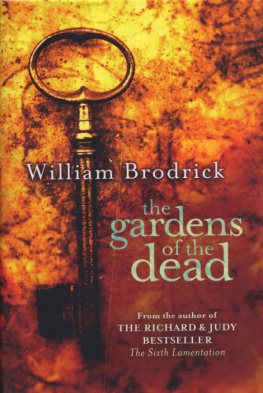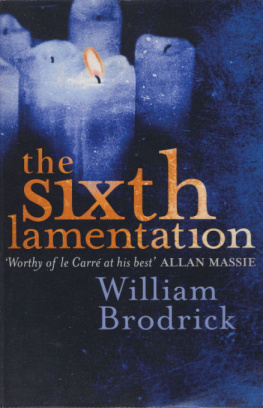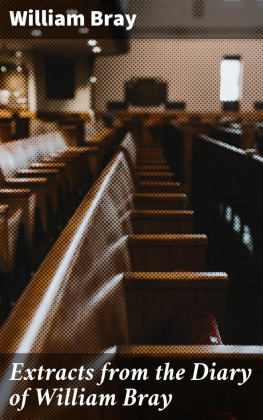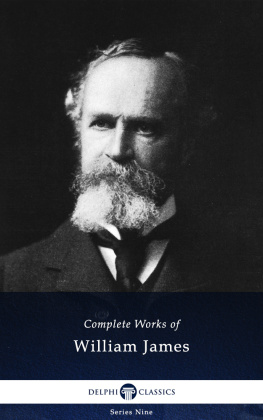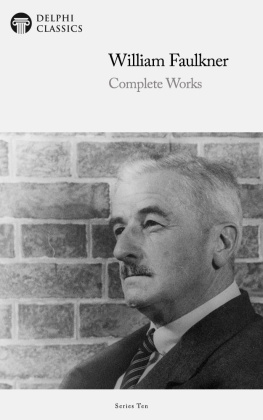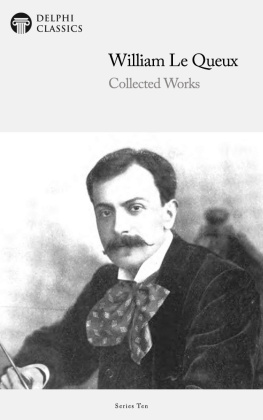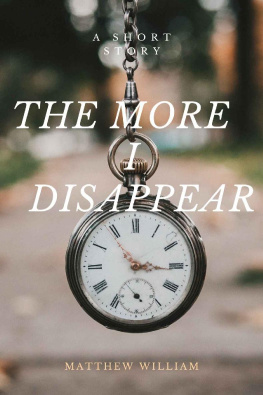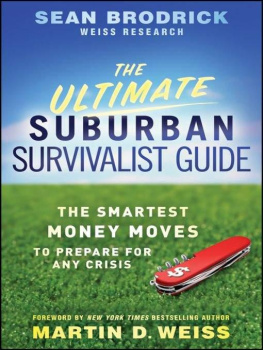William Brodrick - The Day of the Lie
Here you can read online William Brodrick - The Day of the Lie full text of the book (entire story) in english for free. Download pdf and epub, get meaning, cover and reviews about this ebook. genre: Detective and thriller. Description of the work, (preface) as well as reviews are available. Best literature library LitArk.com created for fans of good reading and offers a wide selection of genres:
Romance novel
Science fiction
Adventure
Detective
Science
History
Home and family
Prose
Art
Politics
Computer
Non-fiction
Religion
Business
Children
Humor
Choose a favorite category and find really read worthwhile books. Enjoy immersion in the world of imagination, feel the emotions of the characters or learn something new for yourself, make an fascinating discovery.

- Book:The Day of the Lie
- Author:
- Genre:
- Rating:4 / 5
- Favourites:Add to favourites
- Your mark:
- 80
- 1
- 2
- 3
- 4
- 5
The Day of the Lie: summary, description and annotation
We offer to read an annotation, description, summary or preface (depends on what the author of the book "The Day of the Lie" wrote himself). If you haven't found the necessary information about the book — write in the comments, we will try to find it.
The Day of the Lie — read online for free the complete book (whole text) full work
Below is the text of the book, divided by pages. System saving the place of the last page read, allows you to conveniently read the book "The Day of the Lie" online for free, without having to search again every time where you left off. Put a bookmark, and you can go to the page where you finished reading at any time.
Font size:
Interval:
Bookmark:
William Brodrick
The Day of the Lie
After the Day of the Lie gather in select circle
Shaking with laughter when our real deeds are mentioned.
Czeslaw Milosz, Child of EuropePrologue
An autumn sun lit the beads of dew upon the pink tiles of Larkwood Priory, the seventeenth-century manor that had once belonged to a kings trumpeter. For services rendered belting out pomp for the Reformation hed been given a Benedictine monastery in Suffolk which hed briskly demolished to the benefit of the local building trade, holding back enough stone and timber to erect a residence of more secular appeal. All that remained of the former abbey was a line of soaring, broken arches, the white limestone speckled with lichen and charged with the memory of cowled voices that had sung while the world lay sleeping.
With a troubled humph, Father Anselm Duffy, jazzman, beekeeper and brooder upon lifes conundrums, put the phone down and turned away from the calefactory window that faced the glistening, tangled rooftops.
You want a lawyer? he complained, entering the cloister, still hearing his friends anxious tone.
After the trumpeter had blown himself out and following a noisy inheritance dispute that triggered three hundred years of real estate trade a group of monks had returned to the quiet valley divided by a fast-flowing stream. Penniless and footsore, theyd taken a boat from Calais after the First World War, a motley band of men from different shattered nations with eyes on a wider horizon. By then the manor had crumbled from a prized asset to a maintenance headache that could only be resolved by donation to a cause deemed worthy. The monks Gilbertines this time had solemnly accepted the title deeds only to mislay them within a week. Far from the concerns of ownership, their minds had wandered elsewhere, slowly restoring the tiles, the thatch and the chant, helped by passers-by and well-wishers: anyone with a mind for the value of reflective living. In time, a deep music had pervaded the surrounding countryside, its pulse reaching as far as the holding cells of the Old Bailey where Anselm, then a restless barrister, made a living explaining the difference between justice and mercy.
So you dont want a monk, he mumbled, with a frown.
He opened the door that led to the reception area and paused to glower at Sylvester, Larkwoods timeless Watchman. White-haired and ascetically thin, his bones almost pushing through his soft flesh, the old man had never fathomed the relationship between a telephone and the noise it makes to announce an incoming call. In fairness there was a large console, flashing lights and three internal lines, each with their own receiver, but Sylvester would have been baffled by anything more complex than two tins linked by string. And even then
Sorry, Anselm, said the Watchman, scratching the soft down on his cranium. The thing is, you dont get any warning do you see what I mean? It just rings.
Sylvester, replied Anselm, wondering how to break the news gently, the ring is the warning.
Dont talk nonsense. Sylvester shook a loose fist at the countless thousands who rang without writing first. Its folk today. They never use pen and ink. Whats wrong with paper? Stamps? Envelopes? Copperplate and decent grammar?
Things arent what they once were, sighed Anselm.
Theyre not.
Much that was good has passed away.
Too true.
These are the dark times.
Sylvester prodded the phone as if to check it was still alive. Anyway, no harm done. You got the call.
I did. Your triumph, at least, remains.
Having bowed with that special ceremony reserved for Larkwoods most frustrating yet best loved elder, Anselm stepped outdoors remembering the pithy conversation with John Fielding, the old friend whose urgent call had initially been routed to various extensions in the monastery where Anselm was least likely to be found.
I need a lawyer, he quoted, heading towards the woodshed.
The phrase was laden with the past. It rang from nineteen eighty-two when Anselm had still been at the Bar and when John, booted out of Warsaw by the Communist Junta, had come back to London with a swollen jaw talking about a violent arrest in a graveyard. The real, abiding injury, however, had been out of sight. The look in Johns eye told something of the pathology but Anselm had never been able to properly construe the symptoms. Like Sylvester, hed needed something simple to hang on to, and John had become complicated; he wouldnt explain. Part of him had been secretly dying; and localised death the inner kind had ultimately left its imprint. Dragging open the large door that hung on one valiant hinge, Anselm paused to inhale the warming aroma of dry wood shavings mingled with the zest of fresh cut timber.
Id better explain in person, John had continued. You know I dont like the phone.
Thered been no further elaboration. John had simply asked if he could come to Larkwood that evening. Ill make a fire, Anselm had replied, knowing from that pointed reference to the law that John intended to go back to the cold part of his life: to his secret meetings with dissident thinkers and his brush with State violence. But Anselm was also apprehensive. Johns voice had been tense, his breath catching on the line.
Why now? murmured Anselm, running his thumb across the dull edge of an axe. What has happened to bring back that unforgotten year?
Lengths of wood, old and new, were stacked in different piles at opposing ends of the room. Anselm went for something green, something that was still holding sap.
Part One
Chapter One
Oh no, snapped Roza. Its him again.
The lawyer had written formally to Madam Roza Mojeska. Hed telephoned, late and early Hed left brisk messages on the answer machine. Hed written more letters. Hed trailed Roza around Warsaw in that battered blue 2CV, pleading his case through an open window. Undeterred by the constant refusals, hed turned up cold and knocked on Rozas door. Hed pushed lightly against the frame, with Roza shoving back from the other side. Hed flicked a business card through the closing gap. And now he was having another go late on a Sunday afternoon.
Blast him.
Roza had only looked out of the kitchen window by chance. Shed just thrown back a Bison Grass snifter on her doctors orders and was about to rinse the glass when she glimpsed that car parked on the main road, three floors down. Which meant the lawyer must be on his way up.
Theres no stopping him, muttered Roza.
Hes brought a sleeping bag; he wont leave until I give in.
Without grabbing a coat or knowing where she was going, Roza slammed the door behind her and ran down the corridor towards the fire escape that led to a courtyard of bins and slumped refuse sacks. She might be 80, but Roza could move. Every day she walked through the city going nowhere in particular. The exercise kept her strong. It burned up the energy of untold memories. They were burning now as she nipped across the yard and entered the dark passage that linked her block of flats to a neighbouring complex. She hurried close to the wall, her gaze fixed on the autumn light framed by stained concrete. A plan was forming shed head into town and hang around the Palace of Culture and Science. A gift from the Soviets, she liked to imagine its demolition. Stepping into the warmth and light, Roza paused. There were children in the quadrangle. Two girls turned the rope while a third skipped, her white dress bright and clean, flying like bunting in the wind. A boy in a tracksuit, bored and brooding, sat on a step offering advice and insults.
Do they know your story? came the voice.
Roza turned wearily to her side. Leaning on the wall, legs crossed, hands in his tatty jean pockets, was the lawyer. Hed kept his good shoes on Roza always noticed shoes and clothing; it had come with life in an orphanage, that never-forgotten world of shapeless hand-me-downs and patched elbows and they still hadnt been polished.
Font size:
Interval:
Bookmark:
Similar books «The Day of the Lie»
Look at similar books to The Day of the Lie. We have selected literature similar in name and meaning in the hope of providing readers with more options to find new, interesting, not yet read works.
Discussion, reviews of the book The Day of the Lie and just readers' own opinions. Leave your comments, write what you think about the work, its meaning or the main characters. Specify what exactly you liked and what you didn't like, and why you think so.

